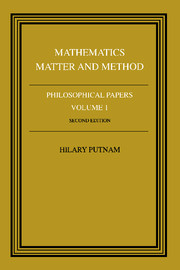Book contents
- Frontmatter
- Contents
- Dedication
- Introduction
- 1 Truth and necessity in mathematics
- 2 The thesis that mathematics is logic
- 3 Mathematics without foundations
- 4 What is mathematical truth?
- 5 Philosophy of physics
- 6 An examination of Grünbaum's philosophy of geometry
- 7 A philosopher looks at quantum mechanics
- 8 Discussion: comments on comments on comments: a reply to Margenau and Wigner
- 9 Three-valued logic
- 10 The logic of quantum mechanics
- 11 Time and physical geometry
- 12 Memo on ‘conventionalism’
- 13 What theories are not
- 14 Craig's theorem
- 15 It ain't necessarily so
- 16 The ‘corroboration’ of theories
- 17 ‘Degree of confirmation’ and inductive logic
- 18 Probability and confirmation
- 19 On properties
- 20 Philosophy of Logic
- Bibliography
- Index
4 - What is mathematical truth?
Published online by Cambridge University Press: 04 August 2010
- Frontmatter
- Contents
- Dedication
- Introduction
- 1 Truth and necessity in mathematics
- 2 The thesis that mathematics is logic
- 3 Mathematics without foundations
- 4 What is mathematical truth?
- 5 Philosophy of physics
- 6 An examination of Grünbaum's philosophy of geometry
- 7 A philosopher looks at quantum mechanics
- 8 Discussion: comments on comments on comments: a reply to Margenau and Wigner
- 9 Three-valued logic
- 10 The logic of quantum mechanics
- 11 Time and physical geometry
- 12 Memo on ‘conventionalism’
- 13 What theories are not
- 14 Craig's theorem
- 15 It ain't necessarily so
- 16 The ‘corroboration’ of theories
- 17 ‘Degree of confirmation’ and inductive logic
- 18 Probability and confirmation
- 19 On properties
- 20 Philosophy of Logic
- Bibliography
- Index
Summary
In this paper I argue that mathematics should be interpreted realistically – that is, that mathematics makes assertions that are objectively true or false, independently of the human mind, and that something answers to such mathematical notions as ‘set’ and ‘function’. This is not to say that reality is somehow bifurcated – that there is one reality of material things, and then, over and above it, a second reality of ‘mathematical things’. A set of objects, for example, depends for its existence on those objects: if they are destroyed, then there is no longer such a set. (Of course, we may say that the set exists ‘tenselessly’, but we may also say the objects exist ‘tenselessly’: this is just to say that in pure mathematics we can sometimes ignore the important difference between ‘exists now’ and ‘did exist, exists now, or will exist’.) Not only are the ‘objects’ of pure mathematics conditional upon material objects; they are, in a sense, merely abstract possibilities. Studying how mathematical objects behave might better be described as studying what structures are abstractly possible and what structures are not abstractly possible.
The important thing is that the mathematician is studying something objective, even if he is not studying an unconditional ‘reality’ of nonmaterial things, and that the physicist who states a law of nature with the aid of a mathematical formula is abstracting a real feature of a real material world, even if he has to speak of numbers, vectors, tensors, state-functions, or whatever to make the abstraction.
- Type
- Chapter
- Information
- Mathematics, Matter and MethodPhilosophical Papers, pp. 60 - 78Publisher: Cambridge University PressPrint publication year: 1979
- 34
- Cited by



